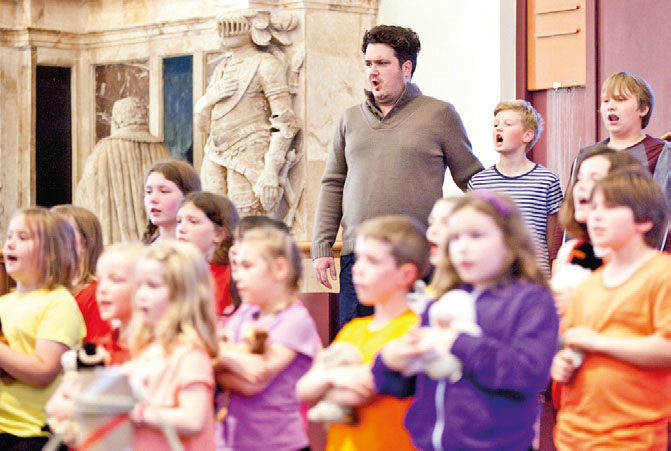
Young singers and instrumentalists from Dunbar, East Lothian, will be brought together with amateur adults and professional musicians in a new community opera An Cadal Trom (‘A Deep Sleep’) by Scottish-Gabonese composer Matthew Rooke, to be performed in Dunbar Parish Church on 22 September as part of Lammermuir Festival.
The production follows on from the festival's first community opera in 2016, a performance of Benjamin Britten's Noye's Fludde – by all accounts a huge success, garnering five-star reviews. This new project is promoted by Music Co-OPERAtive Scotland (McOpera), an association of musicians from the Orchestra of Scottish Opera who present concerts, corporate events, and outreach and education projects during production-free weeks.
Project coordinator Sue Baxendale explains: ‘It was hard to find a follow-up to Noye's Fludde that has the same breadth of opportunities for both trained and untrained singers and for the youngest instrumentalists. We were also keen to create something site-specific for Dunbar, so we commissioned Matthew, who lives not far away in North Berwick and is very familiar with the geology and heritage of this coastal area.’
An Cadal Trom features a pilgrim's chorus of young people and adults, and the story begins as they embark upon a new ‘Forth to Farne’ pilgrimage route (from the Firth of Forth to the Farne Islands). Resting overnight after a fractious start to their journey, they are taken back in time in their dreams to explore the history and legends of the area from the Ice Age, through Roman expeditions into Scotland and the 14th-century siege of Dunbar, before continuing to their destination and discovering what they mean to one another. The opera culminates in a joyful celebration of recognition and community.
Creating an opera
Serious work on the project started in January when community theatre students from Queen Margaret's University in Musselburgh began a seven-week residency with Primary 5 (Year 4 in England and Wales) pupils in Dunbar Primary School on theatrical techniques such as delivering text. Fashion students from the university are working with the costume and design team, with local craft and knitting groups also involved. Meanwhile, dance teachers from East Lothian are working on choreography in close collaboration with the opera's director, Jack Furness.

Baritone Andrew McTaggart (centre) performing in Noye's Fludde © ROBIN MITCHELL
More recently, chorus master Moira Morrison ran a music workshop in the primary school, open to all and including an invitation to be part of the chorus of An Cadal Trom. Music will be learned in a free summer holiday course, funded by Lammermuir Festival. The full production period runs from 11 to 22 September, with a primary chorus rehearsing in school hours and the instrumentalists and pilgrim chorus, which includes members of youth choir Dunbar Voices, in the evenings and over the weekend.
A central role in the production is played by instrumentalists from Dunbar Music School. The school was set up in 2016 by Siobhan Greally – a flautist from the London Symphony who identified a need for music lessons for children and adults in East Lothian when she moved north from London – and Jacqui Preston, a graduate in music of Exeter University and in music education of Trinity Laban Conservatoire. The school provides tuition in traditional Scottish music as well as classical instruments, and as many pupils as possible will be involved in An Cadal Trom.
The performance will be conducted by Sian Edwards, a former music director of the English National Opera, and features two professional opera singers – mezzo-soprano Penelope Cousland and baritone Andrew McTaggart – and 13 professional players from McOpera.
Although this is a community opera, its ethos is very much in the spirit of Lammermuir Festival, which aims to bring the finest international musicians and emerging artists to East Lothian. ‘The quality of the music and its professional delivery is at the heart of what they do,’ says Baxendale, ‘so for An Cadal Trom we are only using players who are experienced in performing opera and understand that the role of the music is as a subtext to what is happening on stage and the emotional journey of the cast. This sort of project is hugely empowering for them as well as for the children and amateur performers – already it has been a phenomenal journey.’








